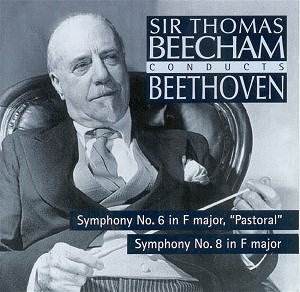Beecham’s Pastoral seems to have caused some
considerable difficulties. It was recorded over a period of six months
on no less than six days. The first part – it was recorded on shellac
and tape simultaneously – ran to five takes on the first day of recording,
7th December 1951. Orchestra and conductor reconvened just
over a week later for another session followed by two more on consecutive
days. A further session was necessary on 5th May 1952. This
was hardly a unique occurrence, given Beecham’s commitments and peripatetic
nature and many others could equally be cited – the Eroica for
example was begun just after the Pastoral and was similarly prolonged,
with Beecham returning to edit movements one and three on 13th
August 1952. Nevertheless this was a prolonged recording, the disparate
nature of which is not reflected in the finished recording which evinces
a geniality and easy going charm all Beecham’s own.
Elegance of phrasing informs the opening movement which
is taken at a leisurely pace, and maybe one that never quite reconciles
itself to optimum thematic integration. The slow movement is again slow
but by no means unconscionably so – Stokowski, in his exceptionally
vivid and convincing near contemporaneous recording was significantly
slower still and equally maintained structural control. I particularly
admire the way Beecham’s phrasing necessarily involves the subsuming
of lower string material into both a cohesive sonority and a musical
argument. His basses are not overblown, there is no weightiness for
its own sake, and textures are light and clear. He shapes the succeeding
Allegro with real finesse with abundant examples of orchestral sophistication
to note, prominent amongst them the clarinet of Jack Brymer and the
horn of Dennis Brain. In the final movement Beecham moulds the bass
lines and sees to the apposite dynamics of the wind choirs in relation,
sectionally, to the whole; the unanimity of the violins, affectionate
and yielding, is delightful.
The F Major, No 8, has a deal of energy and zest, crisp
- but not cursory - accents animating the opening movement. There’s
also plenty of gruff wit which emerges naturally from the lines and
is never overplayed. The Tempo di Minuetto is maybe rather more suave
than might be the case – a little more earthiness wouldn’t have gone
amiss – but there’s nothing at all wrong with Beecham’s distinguished
insight into the meditative central panel of the concluding Allegro
vivace, which he illumines with especial sensitivity. I enjoyed Beecham’s
way with these symphonies and as his wondrous live Leeds performance
of the Missa Solemnis shows there’s still much to uncover when
it comes to Beecham the Beethovenian.
Jonathan Woolf


